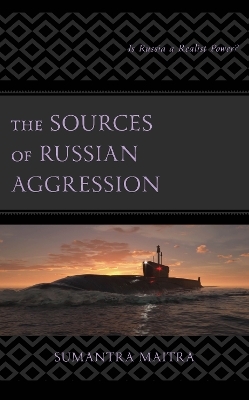
The Sources of Russian Aggression
Is Russia a Realist Power?
Seiten
2024
Lexington Books/Fortress Academic (Verlag)
978-1-6669-3584-4 (ISBN)
Lexington Books/Fortress Academic (Verlag)
978-1-6669-3584-4 (ISBN)
Over the last decade and a half, shifting geopolitical setting in Europe renewed the question about Russian military capabilities and strategic intentions. This book explains Russia’s balancing behavior and use of military force in Europe and finds timeless principles which explains and even predicts future Russian aggression.
Moscow indulges in the military use of force and balancing behaviour, only when it perceives its interests to be threatened, but seeks to preserve, uphold, or return to the status-quo the moment the threats subside or are neutralized by balancing actions, acting more as a security maximizer, than a power maximizer. The Sources of Russian Aggression: Is Russia a Realist Power? employs a qualitative research design and case study method, relying on secondary literature, military sources, and observed and recorded news. This evidence relies on Russian strategic actions, and not Russian rhetoric. The evidence explored suggests that Russia balances against perceived threats and that Russian use of force is directly proportional to any strategic and material loss. Alternatively, Russia behaves like a status quo power when the perceived threat subsides. Also, Maitra explains how Russian military aggression is focused on geopolitical balance and has narrow strategic aims, and Russia either lacks the will and/or capability or both to be an expansionist or occupying power. Maitra concludes that Russia is inherently a reactive power with limited regional aims, which are not commensurate with an aspiration of a continental hegemony. The findings have future policy relevance for European/British and American security, as the U.S. grows increasingly isolationist, and NATO and EU rift widens.
Moscow indulges in the military use of force and balancing behaviour, only when it perceives its interests to be threatened, but seeks to preserve, uphold, or return to the status-quo the moment the threats subside or are neutralized by balancing actions, acting more as a security maximizer, than a power maximizer. The Sources of Russian Aggression: Is Russia a Realist Power? employs a qualitative research design and case study method, relying on secondary literature, military sources, and observed and recorded news. This evidence relies on Russian strategic actions, and not Russian rhetoric. The evidence explored suggests that Russia balances against perceived threats and that Russian use of force is directly proportional to any strategic and material loss. Alternatively, Russia behaves like a status quo power when the perceived threat subsides. Also, Maitra explains how Russian military aggression is focused on geopolitical balance and has narrow strategic aims, and Russia either lacks the will and/or capability or both to be an expansionist or occupying power. Maitra concludes that Russia is inherently a reactive power with limited regional aims, which are not commensurate with an aspiration of a continental hegemony. The findings have future policy relevance for European/British and American security, as the U.S. grows increasingly isolationist, and NATO and EU rift widens.
Sumantra Maitra is a senior editor at The American Conservative, a senior contributor to The Federalist, a senior fellow at the Center for Renewing America, and an associate fellow at the Royal Historical Society, London.
| Erscheinungsdatum | 17.04.2024 |
|---|---|
| Sprache | englisch |
| Maße | 158 x 236 mm |
| Gewicht | 535 g |
| Themenwelt | Sozialwissenschaften ► Politik / Verwaltung ► Europäische / Internationale Politik |
| Technik | |
| ISBN-10 | 1-6669-3584-0 / 1666935840 |
| ISBN-13 | 978-1-6669-3584-4 / 9781666935844 |
| Zustand | Neuware |
| Informationen gemäß Produktsicherheitsverordnung (GPSR) | |
| Haben Sie eine Frage zum Produkt? |
Mehr entdecken
aus dem Bereich
aus dem Bereich
Studienbuch
Buch | Hardcover (2023)
De Gruyter Oldenbourg (Verlag)
44,95 €
Amerikas Strategie der Vorherrschaft und der Kampf um Eurasien
Buch | Softcover (2024)
NOMEN Verlag
20,00 €


